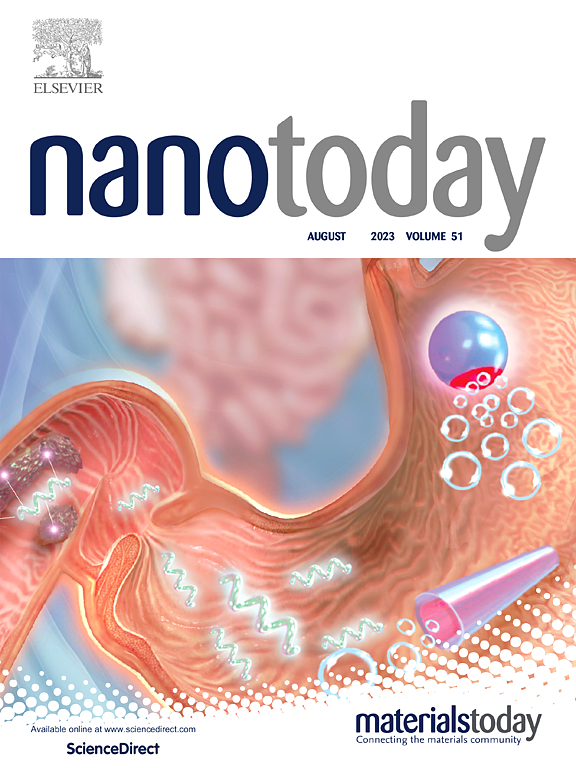Boosting ubiquitin-proteasome system-mediated androgen receptor degradation and cGAS-STING pathway activation for synergistic prostate cancer therapy by engineered zinc-manganese oxide nanoparticles
IF 13.2
1区 材料科学
Q1 CHEMISTRY, MULTIDISCIPLINARY
引用次数: 0
Abstract
Androgen receptor (AR) is an essential target for prostate cancer (PCa) therapy, while required resistance due to AR overexpression/abnormal splicing often leads to therapeutic failure, and how to realize the synergistic therapeutic efficacy for PCa remains a challenge. Herein, a novel paradigm of zinc-manganese oxide nanoparticles (ZMONPs) is rationally engineered, which can cooperate in promoting ubiquitin-proteasome system (UPS)-mediated AR degradation and cyclic GMP-AMP synthase-stimulator of interferon genes (cGAS-STING) signaling pathway activation, thereby generating a tumoricidal immune microenvironment to elicit PCa cell death. Upon lysosomal acidolysis, ZMONPs promote zinc ions overload to produce more reactive oxygen species (ROS), which ultimately contribute to UPS-mediated AR degradation and tumoricidal effect. In PCa mouse models, ZMONPs significantly down-regulate the abundance of AR within the tumor microenvironment, further facilitating cGAS-STING signaling pathway activation to secrete C-C motif chemokine ligand 5 (CCL5) and interferon beta (IFN-β), which enhance dendritic cells (DCs) maturation and cytotoxic T lymphocytes (CTLs) infiltration, thus realizing tumor growth inhibition in a cooperative manner. In addition, co-administration of ZMONPs and docetaxel presents notably synergistic therapeutic efficacy. Collectively, this study highlights the favorable effects of ZMONPs on AR degradation-related hormonal therapy and anti-tumor immunity, which may serve as a promising therapeutic strategy for PCa.
工程锌锰氧化物纳米颗粒促进泛素-蛋白酶体系统介导的雄激素受体降解和cGAS-STING通路激活协同前列腺癌治疗
雄激素受体(雄激素受体,雄激素受体)是前列腺癌治疗的重要靶点,但由于雄激素受体过表达/剪接异常导致的耐药性往往导致治疗失败,如何实现雄激素受体对前列腺癌的协同治疗效果仍是一个挑战。本文合理设计了一种新型的锌锰氧化物纳米颗粒(ZMONPs),它可以协同促进泛素-蛋白酶体系统(UPS)介导的AR降解和环GMP-AMP合成酶刺激干扰素基因(cGAS-STING)信号通路的激活,从而产生一个杀死肿瘤的免疫微环境,引发PCa细胞死亡。在溶酶体酸解过程中,ZMONPs促进锌离子过载产生更多活性氧(ROS),最终促进ups介导的AR降解和肿瘤杀伤作用。在PCa小鼠模型中,ZMONPs显著下调肿瘤微环境中AR的丰度,进一步促进cGAS-STING信号通路激活,分泌C-C基元趋化因子配体5 (CCL5)和干扰素β (IFN-β),促进树突状细胞(dc)成熟和细胞毒性T淋巴细胞(ctl)浸润,协同实现肿瘤生长抑制。此外,ZMONPs与多西他赛合用具有显著的协同治疗效果。总之,本研究强调了ZMONPs对AR降解相关激素治疗和抗肿瘤免疫的有利作用,这可能是一种有希望的PCa治疗策略。
本文章由计算机程序翻译,如有差异,请以英文原文为准。
求助全文
约1分钟内获得全文
求助全文
来源期刊

Nano Today
工程技术-材料科学:综合
CiteScore
21.50
自引率
3.40%
发文量
305
审稿时长
40 days
期刊介绍:
Nano Today is a journal dedicated to publishing influential and innovative work in the field of nanoscience and technology. It covers a wide range of subject areas including biomaterials, materials chemistry, materials science, chemistry, bioengineering, biochemistry, genetics and molecular biology, engineering, and nanotechnology. The journal considers articles that inform readers about the latest research, breakthroughs, and topical issues in these fields. It provides comprehensive coverage through a mixture of peer-reviewed articles, research news, and information on key developments. Nano Today is abstracted and indexed in Science Citation Index, Ei Compendex, Embase, Scopus, and INSPEC.
 求助内容:
求助内容: 应助结果提醒方式:
应助结果提醒方式:


